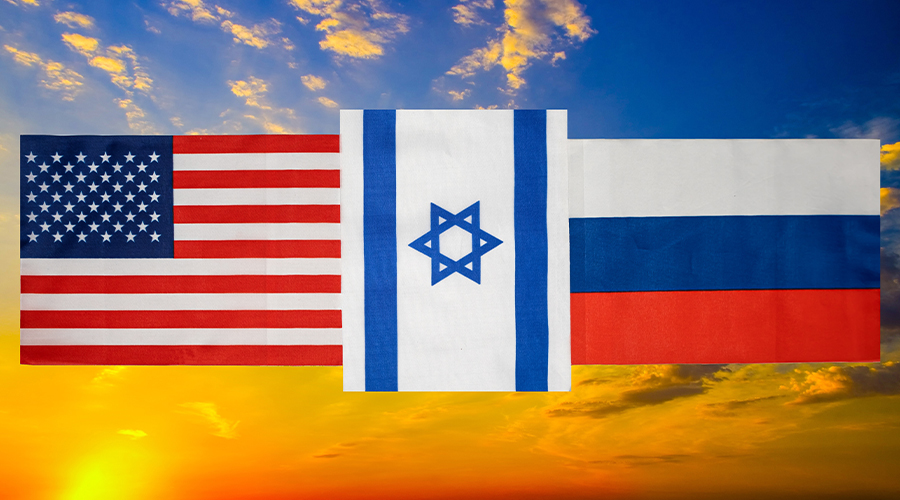In late April 2022, Israel was amongst 40 countries attending a US-led Ukrainian defence summit. Representing Israel was Brig. Gen. Dror Shalom, former head of the political security division of the defence ministry. Since the beginning of the war Ukraine has been highly critical of Israel for not providing weapons and defensive equipment. Western countries however understand Israel’s delicate relationship with Russia; officials assured Dror but hoped his country would step up their support to Ukraine. The same message was delivered during a meeting on 26 April between National Security Advisor of the United States, Jake Sullivan, and his Israeli counterpart, Eyal Hulata.
These meetings were not missed on Russia President Vladimir Putin. In what could signal a significant shift in Moscow’s attitude towards Israel, Russian forces opened fire on Israeli jets with advanced S-300 anti-aircraft missiles at the end of an alleged Israeli Air Force attack on targets in north-western Syria last week. This would mark the first use of the S-300s against the IAF over Syria since 2015 and would be a worrying development for Israel.
The Russian response was surgical. The S-300 attack was launched just as Israeli jets were departing the area, so they did not pose real danger. It could be seen as a soft warning to Tel Aviv. It was also a message sent to the international community: Russia remains in control of Syria and is not disconcerted by the ongoing operation in Ukraine.
Ukraine’s Effect
Initially, Israel took a nearly neutral position. Prime Minister Naftali Bennett tried to leverage his good relations with both Ukrainian and Russian presidents to mediate a de-escalation. Israel was reluctant to supply Ukraine with advanced defence equipment such as the infamous Iron Dome all-weather air defines system. Yet, more recently Israel has shifted its position. In April, Israel agreed to donate helmets, bullet-proof vests, and other light equipment to Ukraine. Health Minister Nitzan Horowitz headed to Ukraine to visit the Israeli field hospital. “We will continue to do all that we can to assist the Ukrainians against the Russians’ brutal attack,” the health minister said in a press conference following his visit, highlighting the shift in Israel’s discourse on the Russo-Ukrainian war. In Israel protests denouncing Russian ‘war crimes’ has flooded the country. Israel has received more than 23 Ukrainian refugees, mostly of Jewish descent. More help was headed Ukraine’s way, Tel Aviv has said.
But Israel was in for a shocker. Russia’s Foreign Minister Sergei Lavrov said May that Ukrainian President Volodymyr Zelensky was a Nazi, that Hitler had “Jewish blood”, and the “most rabid antisemites tend to be Jews”. Israel denounced his comments as “unforgivable” and summoned Moscow’s Ambassador, Anatoly Viktorov, for a “tough conversation”. Therefore, the most recent escalation in Syrian city of Masyaf has fuelled speculation over the future of the Israeli-Russian relations.
Unrests in Jerusalem
Israel understands it need to choose its battles carefully. The recent escalations in Al-Aqsa Mosque and Jenin have spiralled threats by Hamas’ Yahya Sinwar to launch an all-out rocket attack on Israeli sites. Inside Israel, tensions are heightening. Bennett’s government is shaky as members of his coalition government threaten to resign in protest of the way Israeli security forces have handled the Palestinians. Israel’s priorities thus are centred nationally, not in Ukraine or Syria.
Similarly, Russia is not interested in escalation. Both states are inclined to defuse the tensions despite pressures mounting by Washington. Bennett needs Israel’s historical ally more than ever: Tel Aviv is alarmed by Hamas’ threats and the magnitude of a new Iranian nuclear deal looms over Israel’s regional security. And while Putin has been a strategic partner to Israel, Russia cannot be relied on in case the rising violence the Occupied Territories spark a third Intifada. Putin would not Veto any UN Security Council draft condemning Israel. Bennett is also mindful that Putin’s tolerance to Israeli strikes in southern Syria is key to securing the Israel-Syria borders and clearing Hezbollah’s threatening presence.
Anxiety
Evident in Syria, Putin is an unswerving ally when compared to the Americans who handed over Afghanistan to the Taliban in a clumsy manner. Indeed, the US track record worries its allies: the US abandoned former Shah of Iran Mohammed Reza Pahlavi in 1979; its key strategic partners in the Middle East in the aftermath of the 2011 unrests; and the Kurdish armed groups as Trump ordered the sudden withdrawal from Syria.
The withering away of US presence in the Middle East concerns Israel which remains highly dependent on American support in the region. One the one hand Israel cannot establish a deep alliance with Russia in order to avoid upsetting its historical ally in Washington; on the other hand, it cannot afford a confrontation with Russia in Syria. Therefore, Israel must balance its relationship with both Russia and the US to secure its interests in the region. Putin thus has the key to keep Israel’s support to Ukraine in check: he may let Hezbollah gain more control in the Israel-Syrian borders.
To a similar effect, the Ukrainian war has certainly put Russia-Turkey relationship to the test. President Erdogan has supplied Ukraine with Bayraktar drones which have been instrumental to Ukraine’s war with Russia. Putin’s answer was a heavy airstrike of areas close to Turkish-supported Syrian militias. Russia has also let Kurdish armed groups increase their shelling of Turkish areas all the way near the city of Gaziantep in Turkey.
In conclusion, Bennett is keen to avoid a complication similar to the one between Russia and Turkey described above. He is balancing a delicate relationship with both Russia and the US to secure Israel’s borders as well as prepare for a possible worsening scenario in the Occupied Territories


